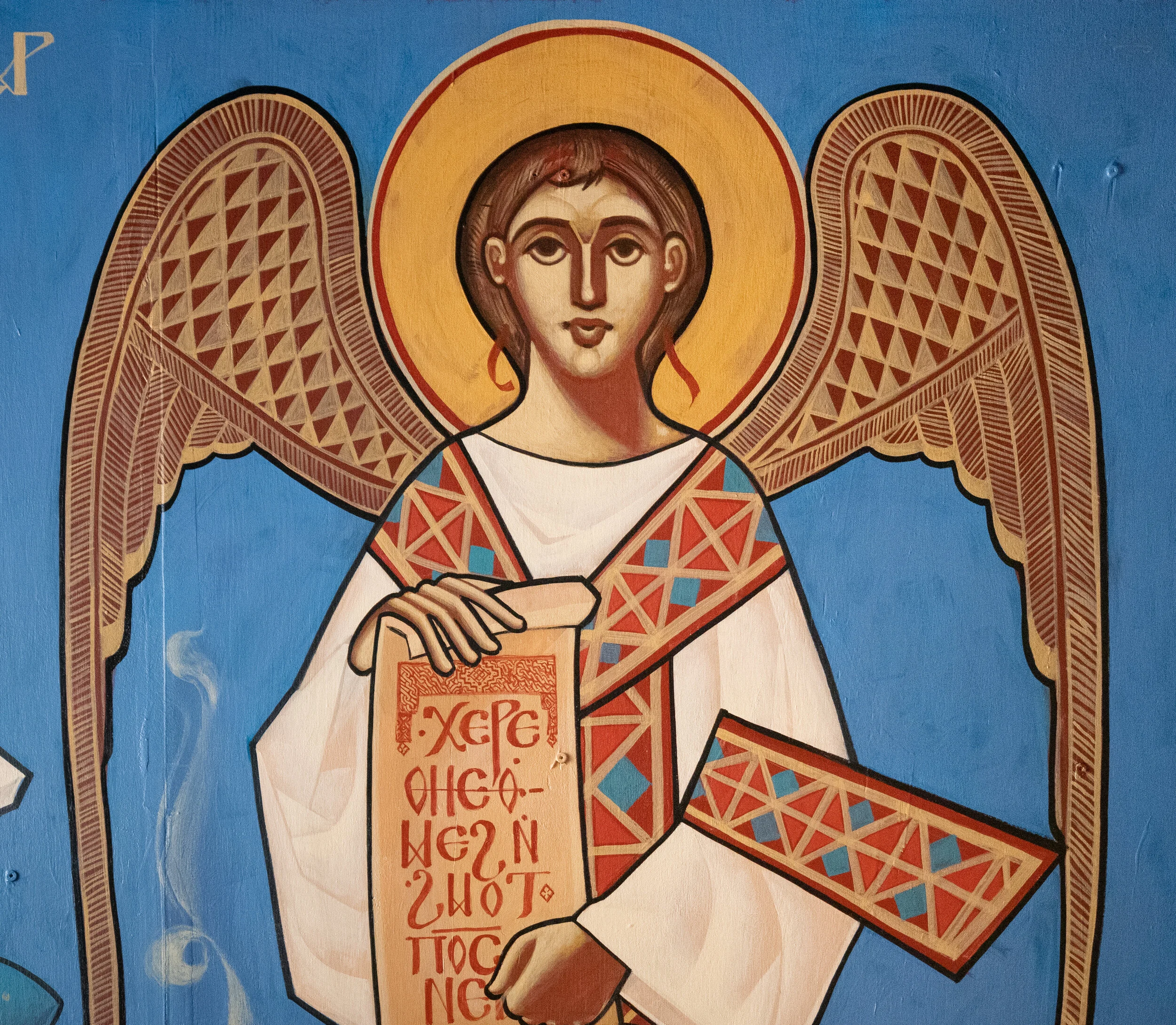The altar is never without a tremor, never entirely silent; the one who keeps vigil soon discovers that, beneath the veneer of domestic order, lies a wilderness of ancient voices, children weeping in the dark, the echo of footfalls at the threshold where the known surrenders to the feral. Under the gaze of the lunar tide, the name of Abanoub surfaces, pale gold glinting at the river’s edge, innocence fused with tribulation. There is an old tie between saints and gods, a cross-current where the purest martyr and the black-faced jackal of Egypt touch paws and hands across the darkness. Abanoub: the child of gold; Anoubis: the guide of souls through the dead water; both invoked in a city trembling with violence, both present where the scream rises through the stairwell and the watcher at the window dares the archangels to intervene. The legend says the child saw Michael before his suffering in Samanoud; the vision never promises safety, only a seal for the journey through the jaws of the underworld. When the path calls, it does not command the storm; it opens the gate, so the old Light might descend in the hour of need.
I. The Child and the Jackal
In the house of the exiles, every name is double-edged. Each syllable hides a relic of the old kingdom, a cipher echoing the descent through shadow. Abanoub, that crystalline, infant martyr of the Nile, stands at the crossroads of the world’s innocence and its perpetual violence. His name carries the resonance of treasures not buried but revealed. Yet gold in Egypt was always a thing of the dead, the skin of the immortal, the offering sealed into tombs to placate powers below. To utter Abanoub in the mouth of the channel is to summon the brilliance of the offered child and the darkness that swallows the innocent, just as Anoubis, jackal-headed, weighs the heart against the feather in the silent chamber of the night.
There is no comfort for the one who prays at the window whilst cries rise in neighbouring walls; intercession is not an exorcism of the world, but an entry into its unsheltered core. In such moments, the one who watches carries equally the terror of the child and the dread wisdom of the jackal. Abanoub does not escape the violence; he is transfigured within it, sealed by the vision of Michael and attended by angels who do not shield but escort. The echo lingers: suffering foretold is suffering transmuted; never demanded, always answered. The presence of the angel is not the absence of pain, but the creation of a thread where violence may hesitate, where even in the furnace the golden child is not alone.
II. The Vision and the Gate of Samanoud
The vision comes before the ordeal. The archangel Michael appears to Abanoub and names the place: Samanoud, where suffering will unfold. One is given no map but a promise; the gate will open, the water will part, the jackal will be there with gold in its mouth. In the cycle of violence, whether on the streets of Samanoud or in any city’s stairwells, there is always a threshold, a limen where the archangel stands between the living and the dead, between innocence and destruction.
The watcher at the doorway, in their own night of trembling, may only offer the gold of the heart: the prayer, the breath, the ritual invocation. To call the angels into a scene of violence is not to force a miracle, but to manifest the space where a hand is stayed, a shriek is softened, a shadow remembers itself as Light. The gate is opened by fidelity, not power; the vision granted is the promise that, even as the wound is opened, the child is accompanied, never forsaken. The jackal becomes the guardian; Michael becomes the sword that marks.
Coda: Meditations Under the Lunar Gate
As the Moon approaches her exile in Scorpio, descending toward the hidden waters, one is invited to pause at the ninth sphere: Yesod, realm of Gabriel, keeper of all that flows and is veiled. In these times, when the world’s violence is unmasked, meditation becomes an act of fidelity to the invisible: draw a circle of water, salt, and flame. Place a bowl at the altar’s edge, and call quietly, with breath more than with words, upon Gabriel, archangel of the waters and psychopomp of the living dream.
Gaze into the water’s skin; offer the names of the wounded, the lost, the frightened. Let the memory of Abanoub – the child who saw the angel, who entered the gate – become the gold you offer, fragile, unfinished, but unburned. Trust that Gabriel carries all tears into the lunar river, all wounds into the arms of the Mother, and that no violence is invisible when offered to the vigilance of the archangels. The watcher becomes altar, the scream becomes offering, the water reflects a light that survives the passage through Samanoud.
Tonight, meditate thus: Invoke Gabriel, custodian of the silver gate. Let the violence pass, but not unmarked. Entrust to the Moon all that trembles; Let Yesod be the womb where gold is never lost, even in the house of the jackal.
Fiat Lux.
